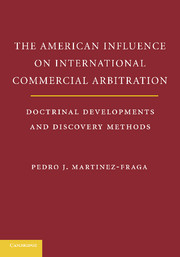 The American Influences on International Commercial Arbitration
The American Influences on International Commercial Arbitration Book contents
- Frontmatter
- Contents
- Table of Citations
- Acknowledgments
- Foreword
- Preface
- 1 Introduction
- 2 The Formation and Transformation of the Status of International and Domestic Arbitration in the United States
- 3 Wilko v. Swan, Scherk v. Alberto-Culver, and Mitsubishi v. Soler: Crafting a Level Playing Field
- 4 Procedural Change and 28 U.S.C. §1782: The Taking of Evidence v. Common Law Discovery
- 5 The Gathering of Evidence v. Common Law Discovery
- 6 What Has Really Happened? The Effects of a Trilogy Examined
- 7 The New Unorthodox Conception of Common Law Discovery in International Arbitration
- 8 And Now How Do We Avoid 28 U.S.C. Section 1782 in International Commercial Arbitration?
- 9 Perjury & Arbitration: The Honor System Where the Arbitrators Have the Honor and the Parties Have the System
- 10 Developments in the Apportionment of Jurisdiction Between Arbitrators and Courts Concerning the Validity of a Contract Containing an Arbitration Clause, and Transformations Regarding the Severability Doctrine
- 11 U.S. Arbitration Law and Its Dialogue with the New York Convention: The Development of Four Issues
- Conclusion
- Appendix A Duelo a Garrotazos
- Appendix B Selected Cases
- Appendix C The New York Convention, The Federal Arbitration Act, and 28 U.S.C. §1782
- Appendix D Amendments to 28 U.S.C. §1782
- Appendix E Selected Rules of Civil Procedure
- Appendix F Geneva Convention of 1927
- Appendix G Selections from the Legislative History of the Federal Arbitration Act
- Index
- References
2 - The Formation and Transformation of the Status of International and Domestic Arbitration in the United States
Published online by Cambridge University Press: 11 July 2009
- Frontmatter
- Contents
- Table of Citations
- Acknowledgments
- Foreword
- Preface
- 1 Introduction
- 2 The Formation and Transformation of the Status of International and Domestic Arbitration in the United States
- 3 Wilko v. Swan, Scherk v. Alberto-Culver, and Mitsubishi v. Soler: Crafting a Level Playing Field
- 4 Procedural Change and 28 U.S.C. §1782: The Taking of Evidence v. Common Law Discovery
- 5 The Gathering of Evidence v. Common Law Discovery
- 6 What Has Really Happened? The Effects of a Trilogy Examined
- 7 The New Unorthodox Conception of Common Law Discovery in International Arbitration
- 8 And Now How Do We Avoid 28 U.S.C. Section 1782 in International Commercial Arbitration?
- 9 Perjury & Arbitration: The Honor System Where the Arbitrators Have the Honor and the Parties Have the System
- 10 Developments in the Apportionment of Jurisdiction Between Arbitrators and Courts Concerning the Validity of a Contract Containing an Arbitration Clause, and Transformations Regarding the Severability Doctrine
- 11 U.S. Arbitration Law and Its Dialogue with the New York Convention: The Development of Four Issues
- Conclusion
- Appendix A Duelo a Garrotazos
- Appendix B Selected Cases
- Appendix C The New York Convention, The Federal Arbitration Act, and 28 U.S.C. §1782
- Appendix D Amendments to 28 U.S.C. §1782
- Appendix E Selected Rules of Civil Procedure
- Appendix F Geneva Convention of 1927
- Appendix G Selections from the Legislative History of the Federal Arbitration Act
- Index
- References
Summary
THE HISTORICALLY CONVENTIONAL VIEW OF ARBITRATION IN THE UNITED STATES
It is impossible to sever the U.S. judiciary's early bias against arbitration from the disdain of arbitral proceedings that pervaded English courts. A brief historical schematic is presented here.
After the 1687 enactment of the Statute of Fines and Penalties, arbitration agreements were stripped of all juridic efficacy for many reasons. The primary reasons, however, were that they were not enforceable in equity, could not give rise to a cognizable cause of action, and did not constitute a viable ground for issuing a stay of a judicial proceeding based on the identical underlying cause of action between the same parties. Significantly, the Act of 1854 vested courts with the discretion to stay a legal proceeding in deference to arbitration agreements, and such stays would be irrevocable but for leave of court. In this same vein, the Arbitration Act of 1889 rendered arbitration agreements irrevocable absent a court order to the contrary. Additionally, this Act provided that an arbitration agreement was endowed with the same effect as if issued by court order and bestowed courts with authority to review legal questions raised during the final arbitration hearing. Notwithstanding these enactments, in the middle of the eighteenth century arbitration agreements were deemed to be against public policy for two rudimentary reasons. First, arbitration agreements were perceived as private contracts that “oust the jurisdiction” of otherwise courts of competent jurisdiction.
- Type
- Chapter
- Information
- The American Influences on International Commercial ArbitrationDoctrinal Developments and Discovery Methods, pp. 6 - 14Publisher: Cambridge University PressPrint publication year: 2009


